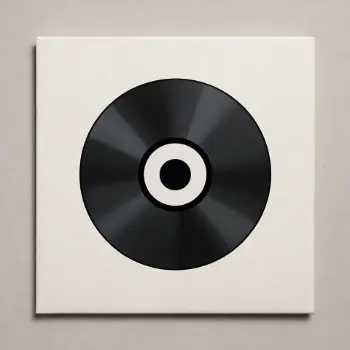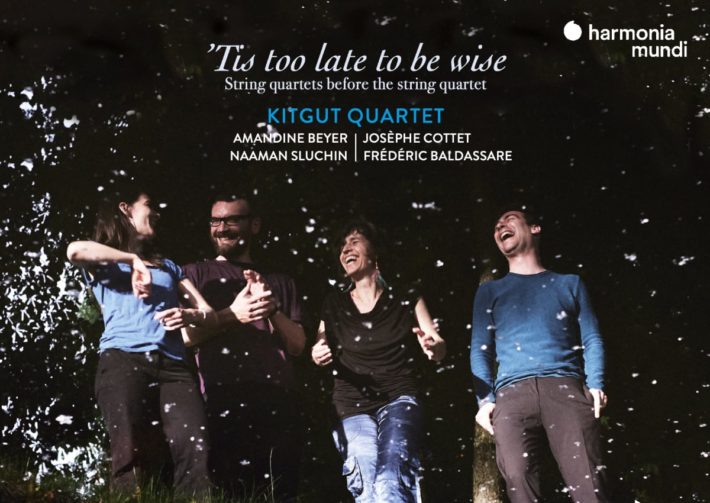When thinking of the String Quartet, composers that spring to mind are Haydn, Mozart, Beethoven and Schubert. Others may include Dvořák, Bartók and Shostakovich. The evolution of the quartet is credited to ‘Papa’ Haydn, with his undoubted development of the genre. With their new album entitled “Tis Too Late To Be Wise”, the Kitgut Quartet explore an area of repertoire not immediately associated with the string quartet œuvre, that of early Baroque theatre music in England.

Chamber music for strings has a long history in the British Isles, harking back to the 16th century during the reign of Elizabeth I. In the grandest of houses, consort music for viols was a popular form of entertainment. Composers like William Byrd and John Dowland produced their highly polyphonic music for up to six viols. Extending into the 17th century, four-part string music was popular in English theatres and it is at this point that the Kitgut Quartet begin their musical journey.
The subtitle of the album is “string quartets before the string quartet” and the Kitgut’s start out not necessarily with string quartets, but string music in four parts. Lifting the curtain on their carefully curated program, they begin with one of England’s most revered composers — Henry Purcell. His ‘Fantasias a 4’, relate to the time of Byrd, Lawes and Gibbons with rich polyphonic textures. Opening with “Fantasia no. 8”, the Kitguts lovingly caress the meandering melodic lines with delicately executed ornamentation. Flowing seamlessly into an extract from Purcell’s music to “The History of Timon of Athens”, they capture the spirit of the dance in this ground. This short sequence of extracts is completed with another ground, an extract from Matthew Locke’s music to “The Tempest”, given a highly expressive performance that exploits its character to the full.
Locke’s “Consort of Four Parts, suite no. 2” is a succinct four-movement suite consisting of a fantasia, two dances (courante and sarabande) and an ayre (old English spelling of Air). The Kitgut Quartet’s evocative performance shows their intrinsic understanding of this style of music. Haydn’s Op. 71 no. 2 quartet is the only non-English work on the album. As the booklet elaborates, this was composed between Haydn’s visits to London. Its shorter movements draw immediate parallels with the Locke preceding it.
The opening movement contains all the witty Haydn trademarks we have come to expect and has a vibrancy throughout. Whilst a pleasing performance, the Classical harmonic language doesn’t complement the Baroque textures of the surrounding works, making it feel slightly misplaced. The album does persuade in the concluding sequence of pieces, returning to Purcell and Locke, again featuring fantasias and theatre music. The final work by John Blow is from his “Venus and Adonis”. It brings an ethereal air, leaving the listener strangely wanting more.
The Kitgut Quartet perform on period instruments. Their sound is balanced and pleasing, with a warmth and rounded quality. They understand the complex textures of this early-Baroque music and are responsive to the style. Ornaments are sensitively handled, understated and never interrupting the melodic line, as exemplified in Purcell’s famed song, “Fairest Isle” (track 13). The simplicity and delicacy with which the Kitgut’s play it is beautiful.
The recorded sound is very good, made in Firm de Villefavard en Limousin, France in February 2019. The recording is sympathetic and the mixing allows good separation of the individual instruments. A short album at less than one hour, but the program is enjoyable and is long enough to entertain, without becoming tiresome. Andreas Scholl’s 2011 album “Solitude” offers a different perspective on some of this repertoire. Those who’ve enjoyed the more complex polyphonic music should consider Phantasm’s (viol consort) recordings of William Byrd or William Lawes, which are approachable gateways into Elizabethan string music.
‘Tis Too Late To Be Wise
String music by Purcell, Locke, Haydn (String Quartet Op. 71 No. 2)
Harmonia Mundi, CD HMM 902313




















